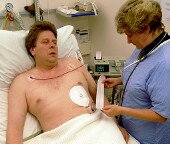 |
 |
 |

Kidney Patients Less Likely to Get Heart Attack Meds
Health service delivery may be a factor is lowered use of beta blockers and statins|
|
HealthDay
By Kevin McKeever
Monday, July 21, 2008
 MONDAY, July 21 (HealthDay News) -- After having a heart attack, people with kidney disease are less likely to receive recommended medications, a new study finds.
MONDAY, July 21 (HealthDay News) -- After having a heart attack, people with kidney disease are less likely to receive recommended medications, a new study finds.
The report, published in the September issue of the Clinical Journal of the American Society of Nephrology, finds people with end-stage renal disease requiring dialysis are often deprived of heart-protecting medicines such as beta blockers and cholesterol-lowering statins.
"Kidney function is a well-established risk factor for cardiovascular events such as heart attacks and is also associated with a worse prognosis after such events," Wolfgang C. Winkelmayer, of Brigham and Women's Hospital, in Boston, said in a news release issued by the American Society of Nephrology. "One possible explanation is differences in health service delivery. It may be that patients with more advanced kidney function receive less state-of-the art care after a heart attack, including less acute coronary intervention, less acute medical intervention and less chronic, secondary prevention."
The researchers analyzed data on medication use after a heart attack, or myocardial infarction, in approximately 21,500 patients, 17 percent of whom had kidney disease. After adjustment for other factors, those with chronic kidney disease were 22 percent less likely to start beta blocker treatment. Those with end-stage renal disease were 43 percent less likely to be treated with angiotensin-converting enzyme inhibitors or angiotensin receptor blockers and 17 percent less likely to be put on statins.
Those three drugs, along with aspirin, are considered vital parts of the strategy to prevent more cardiovascular issues following a heart attack.
As the rates of kidney disease continue to rise, the researchers concluded that new ways of cutting the risk of cardiovascular episodes among this group should become a greater priority.
HealthDay
Copyright (c) 2008 ScoutNews, LLC. All rights reserved.
Related News:
More News on this Date
Related MedlinePlus Pages:
| Home | Health Topics | Drugs & Supplements | Encyclopedia | Dictionary | News | Directories | Other Resources | |
| Disclaimers | Copyright | Privacy | Accessibility | Quality Guidelines U.S. National Library of Medicine, 8600 Rockville Pike, Bethesda, MD 20894 National Institutes of Health | Department of Health & Human Services |
Date last updated: 22 July 2008 |




